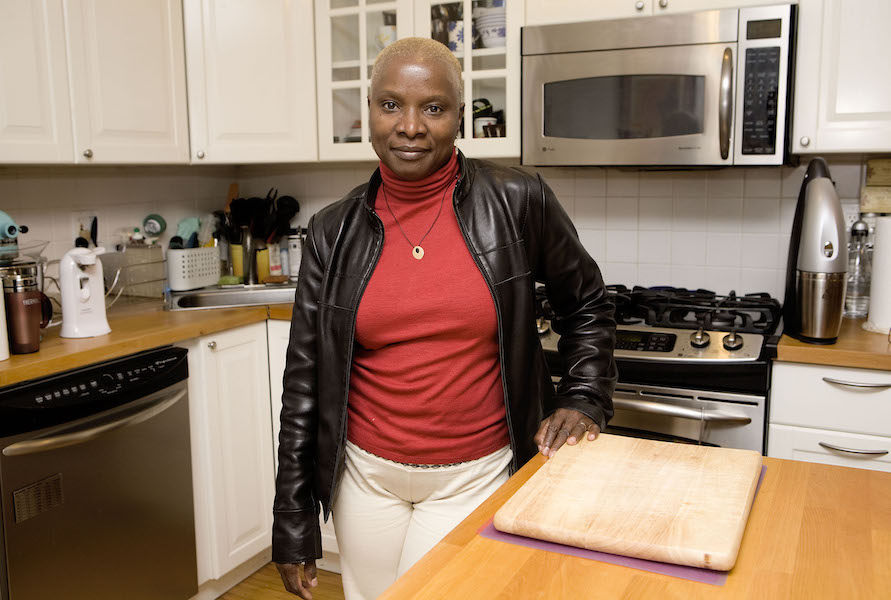Angélique Kidjo is a Grammy Award-winning singer-songwriter deemed “Africa’s premier diva” by Time Magazine. Her internationally acclaimed repertoire includes collaborations with the likes of Bono, Carlos Santana, Peter Gabriel, Alicia Keys and Dave Matthews. Kidjo travels the world both as a performer and as an international activist, but calls the South Slope home. We stopped by to ask what she eats, and were treated to a surprise delectable meal.
For African people, food is important. Even if you visit a really poor family, if there’s only [enough for one person] you are gonna eat and they will go to bed hungry, because guests are very important. That’s the way it goes. Life is made of food. My ancestors were fishermen, and we had plentiful fish. I started cooking when I was 8. In a family of 10 kids, even my brothers learned to cook. They learned how to sew. Last time I was in Paris I had a hem that was too long so I took it to my brother.
There were moments that we had no food at all, but my mom is a gardener and every time it was possible, she made sure we had vegetables. I moved to Paris when I was 22 and when she came to visit she brought carrots. I said, “Mom, we have carrots here.” The thing is, it’s not the same taste.
Where I come from, we have 11 different kind of spinach. Some you eat in salad, some in tomato sauce, some you boil and eat cold with smoked fish. Very typical is a bitter spinach, we call it, how can I say it, convalescence, somebody’s sick. When somebody loses their appetite, it wakes up their taste. Some spinach I can’t find here, only frozen. There are stores in Harlem, and another behind Port Authority called Africa Market. If I want to cook African foods, it’s a lot of work to find the ingredients. That’s why when I go to Africa I bring them back. There is a paste I bring back frozen from Benin; my mom still makes it for me. It’s the secret ingredient in West African cooking.
This is a Scotch Bonnet hot pepper. I bought it at Union Market.
This, you don’t come close to it. It’s the Scotch Bonnet made into a paste. I bought it in Paris. When I have time I make it myself: Garlic, ginger, peppers, ground on a stone.
I buy my fish in Chinatown. I go in the morning, around 8, and it’s already late. They have to be alive. I keep the head for boullion. I buy also crabs, for Thai curry. I cook Indian, African, French, Thai. Thai curry paste is a long process to make yourself, but you can find the ingredients—there’s a shop on Mulberry Street, called Thai Grocery. I’m going there actually this afternoon; I buy a tropical fruits there, like jackfruit. When I come back from tour I live on Detox tea, even though I am very careful what I eat. If I stuff up my stomach I cannot sing, can’t jump, can’t dance. I eat a lot of banana because I sweat so much on stage I need potassium back.
One of the things I bring from France is lemon vinegar. My dressings are always successful because of this. It’s a vinaigrette mixer. I have two. I’m addicted to Tupperware. My husband is like, “We have too much Tupperware, throw some out!” My sister used to sell it, in France. She’s also an orthodontist, but she does this too because she loves it.
I’m a UNICEF Goodwill Ambassador. I went to Tanzania, Malawi, Zimbabwe… One of my campaigns has been Girls’ Education. I did PSAs in many languages to urge parents to get girls to school. In Haiti I did a campaign on newborn tetanus. People think tetanus already disappeared. No. Every four minutes it kills a child in a poor country, although the vaccine has existed more than 80 years. Seems a very simple process in the Western world, but not everybody can come to the city for the vaccination. We come to people and say, this is a problem in your community, how can we solve it together?
The population of the planet is growing so we have to feed everybody. But do we have to poison everybody? There are farmers on every continent and you cannot tell me that farmers cannot feed the people of the world. We just have to follow the seasons and let the nature be nature. Why you wanna eat strawberry when it’s not strawberry time? We get spoiled, and at the same time we complain about processed food. It’s our demand that makes us collateral damage to the people making money from the food that we eat. We have to turn around our habits and force them to feed us properly.
One of the things that makes me want to scream is the chicken-rich countries dump in Africa. It’s filled with antibiotics, and because of the subsidies in Europe and America, it’s cheaper. African farmers don’t have subsidies, don’t have the same machines. They cannot feed their own family or country anymore. It’s complete madness. This crisis is because there’s not enough moral value in the way we do money. One problem that is gonna hit us hard is that we are gonna come to a shortage of water. Will we share this natural resource? We have to find long-term solutions not only profitable for one group of people, but for the whole. That’s the only way we can achieve peace.



